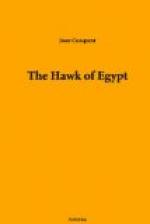“Yes, many,” he had quietly answered as he bent to pick up her torn, handkerchief. “Am I not a rich man?”
He had returned to Egypt upon a visit to the Flat Oasis where dwelt his parents, who, though noting the indescribable hurt in the eyes of their firstborn, yet asked no question, for in Egypt a youth is his own master and ofttimes married at the age of fourteen; how much more, therefore, is he a man at over twenty years?
He had visited his own house in the Oasis of Khargegh, with the purpose of putting his stables in order and his falconers through a stiff catechism, and had finally set out to see something of the world.
Not in a desire to cover his hurt, for he was as stoical as any high-bred Arab; and, Mohammedan from belief as well as early training, did not kick against what he looked upon as the commands of Allah.
As for women—well! The sweet, docile woman of his father’s race interested him not at all, so that he refused to listen to any hint anent the desirability of his taking a wife and establishing the succession of the House ’an Mahabbha, which is the eldest branch of the House el-Umbar; and racial distinction barred him from the virile, lovely women of his mother’s race.
He had his horses, his hawks, his hunting cheetahs, his dogs; one great treasure which he prized and one little conceit.
The treasure had been found in the ruins of the Temple Deir-el-Bahari. An ornament of gold set with precious stones. Its shape was that of the Hawk, which had stood as the symbol of the North in the glorious days of Ancient Egypt. The wings were of emeralds tipped with rubies; gold were the claws and gold the Symbol of Life they held; the body and tail were a mass of precious stones; and the eye of some jet-black stone, unknown to the present century.
As an ornament it was of great value; as an antiquity found in the Shrine of Anubis, the God of Death, its value could not even be guessed at; and how it had come into the possession of Hugh Garden Ali will never be known, though of a truth, unlimited wealth works wonders.
And upon his horses’ saddle-cloths, his falcons’ hoods, his hounds’ coats, and the fine linen and satins of his Eastern raiment he had the emblem worked in thread or silk or jewels, or painted in soft colours.
It was just a pretty conceit, but in conjunction with one-half of his lineage and his love for his birds, it had earned him the title of “The Hawk of Egypt.”
And such was the man as he stood in the market-place, having followed the path which Fate had marked out for him through the twisting lanes of the bazaar.
CHAPTER II
“Dog, ounce, bear and bull,
Wolf, lion, horse.”
DU BARTAS.
Damaris should not have been strolling by herself in the native quarter.




